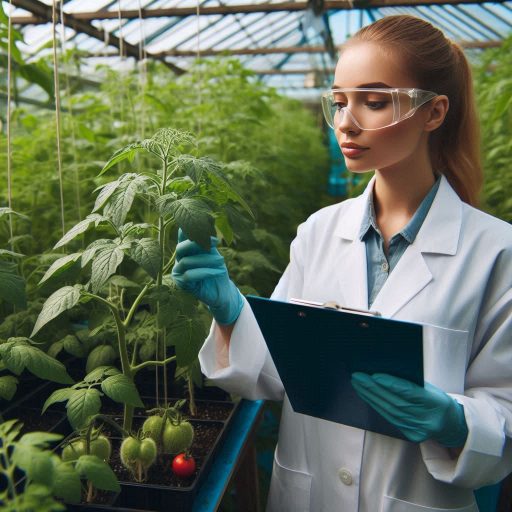Introduction
Plant science plays a vital role in numerous industries, including agriculture, environmental conservation, and biotechnology.
As global challenges like climate change and food security grow, the importance of plant scientists becomes increasingly apparent.
These professionals contribute to developing sustainable practices, improving crop yields, and conserving biodiversity.
The demand for plant science professionals is rapidly increasing in the job market.
Agricultural companies seek experts to innovate and enhance crop production methods.
Environmental organizations look for plant scientists to address ecological issues and implement restoration projects.
Furthermore, biotechnology firms require skilled individuals to develop genetically modified organisms and improve plant traits.
Plant science graduates can pursue diverse career paths, such as research scientists, agronomists, and environmental consultants.
They may also work in government agencies, educational institutions, or non-profit organizations.
Each of these roles allows plant scientists to make meaningful contributions to society and the environment.
In this blog post, we will explore various career paths available for plant science graduates.
We will discuss the skills required for each role and the impact these professionals have on their industries.
By understanding the opportunities in plant science, graduates can make informed decisions about their career trajectories.
Overview of Plant Science Degree
Understanding Plant Science
Plant science is a diverse field that focuses on the study of plants and their ecosystems.
It encompasses various aspects of botany, agriculture, and environmental science.
Plant scientists investigate how plants grow, reproduce, and interact with their environment.
Their work contributes to agricultural productivity, environmental conservation, and food security.
Subfields Within Plant Science
Plant science includes several specialized subfields.
Agronomy focuses on crop production and soil management.
Agronomists work to improve crop yield and sustainability through research and practice.
Horticulture, another subfield, emphasizes the cultivation of fruits, vegetables, and ornamental plants.
Horticulturists develop new varieties, enhance plant health, and improve harvesting methods.
Plant pathology is the study of plant diseases.
Plant pathologists research how diseases affect plants and develop strategies to manage and prevent them.
This field is vital for protecting crops from pests and pathogens.
Plant biotechnology applies molecular biology techniques to improve plant traits.
Scientists in this field work on genetically modified organisms (GMOs) to enhance crop resistance and nutritional value.
Ecology and conservation biology study plant communities and their environments.
These professionals focus on preserving biodiversity and managing natural resources effectively.
Skills and Knowledge Gained Through a Plant Science Degree
A degree in plant science equips graduates with essential skills and knowledge.
Students learn about plant biology, genetics, and physiology.
This foundational knowledge is crucial for understanding how plants function and grow.
Laboratory skills are also a key component of plant science education.
Students gain hands-on experience in conducting experiments, analyzing data, and using scientific equipment.
These skills are vital for research roles in academia and industry.
Additionally, students develop critical thinking and problem-solving abilities.
They learn to design experiments, evaluate results, and make data-driven decisions.
These skills are transferable to various careers beyond plant science.
Communication skills are equally important.
Plant scientists often present their research findings to colleagues, farmers, and the public.
Effective communication ensures that complex information is accessible and actionable.
Moreover, a plant science degree fosters teamwork and collaboration.
Many research projects involve working with multidisciplinary teams.
This experience prepares graduates for collaborative environments in their future careers.
Graduates of plant science programs can pursue diverse career paths.
Many find opportunities in agriculture, working as agronomists or crop consultants.
Others may work in research positions at universities or government agencies.
Horticulturists can explore careers in landscape design, urban agriculture, or nursery management.
Plant pathologists may find roles in agricultural extension services or biotechnology firms.
Additionally, graduates can enter the field of environmental conservation.
They may work with non-profit organizations or governmental agencies focused on biodiversity and ecosystem management.
Plant science is a multifaceted field that offers numerous career paths.
Understanding plant biology, ecology, and agricultural practices is crucial for addressing global challenges.
Graduates gain valuable skills that prepare them for various roles, from research to agriculture and conservation.
With a plant science degree, individuals can contribute significantly to sustainable practices and food security.
Read: U.S. Cities with the Most Opportunities for Environmental Scientists
Potential Career Paths for Plant Science Graduates
Roles in Agriculture, Forestry, Biotechnology, and Environmental Conservation
Plant science graduates have numerous career paths available to them.
Their knowledge and skills are essential across various industries, including agriculture, forestry, biotechnology, and environmental conservation.
These fields offer diverse opportunities that significantly contribute to addressing global challenges.
In agriculture, graduates can work as agronomists, who specialize in crop production and soil management.
They focus on maximizing crop yields while minimizing environmental impacts.
Another common role is that of a plant breeder.
Plant breeders work to develop new plant varieties with improved traits, enhancing resistance to pests, diseases, and environmental stresses.
Forestry provides another exciting career path for plant science graduates.
Foresters manage and conserve forests, ensuring their health and productivity.
They work on reforestation projects, habitat restoration, and sustainable timber production.
Graduates may also specialize as forestry technicians, assisting in implementing forest management plans and conducting research.
In biotechnology, graduates can work as research scientists, focusing on developing genetically modified crops.
They aim to create plants that require fewer resources while producing higher yields.
Regulatory affairs specialists also play a role in this field, ensuring new plant products comply with government regulations.
Environmental conservation is an essential area for plant science graduates.
They can become conservation biologists, studying ecosystems and developing strategies to protect them.
Graduates may also work as environmental consultants, assessing the environmental impact of projects and offering solutions to minimize harm.
Examples of Specific Job Titles Such as Agronomist, Plant Breeder, and Botanist
Several specific job titles highlight the diverse career options available to plant science graduates.
Agronomists specialize in crop production and soil management.
They develop practices that maximize crop yield while ensuring environmental sustainability.
Plant breeders focus on developing new plant varieties with desirable traits, such as disease resistance or improved nutritional content.
They utilize genetic techniques to enhance the resilience of crops.
Botanists study plant biology and ecology, often specializing in specific plant families or ecosystems.
Their research informs conservation efforts and agricultural practices.
Other roles include forestry technicians, who assist in forest management, and biotechnologists, who research genetically modified organisms.
Graduates may also become environmental consultants, providing expertise on the ecological impact of various projects.
The Importance of Plant Science in Addressing Global Challenges Like Food Security and Climate Change
The importance of plant science in addressing global challenges cannot be overstated.
With the world‘s population projected to reach 9 billion by 2050, food security remains a critical issue.
Plant scientists play a vital role in developing crops that can withstand climate change, pests, and diseases.
Additionally, plant science contributes to environmental sustainability.
By promoting sustainable farming practices, plant scientists help preserve ecosystems and reduce resource consumption.
Their work supports initiatives aimed at combating climate change and protecting biodiversity.
As global challenges like food security and climate change persist, the role of plant science becomes increasingly vital.
Graduates are well-equipped to lead efforts in creating a sustainable and resilient future.
Their expertise is essential for developing innovative solutions that ensure food security and promote environmental health.
Read: Environmental Scientist vs. Ecologist: Roles and Differences in the US
Skills and Qualifications Required
Key Skills for Success in Plant Science Careers
Success in plant science careers requires a combination of essential skills.
Research skills are paramount, enabling professionals to conduct experiments and gather data effectively.
Graduates must be adept at designing studies and analyzing results to draw meaningful conclusions.
Analytical thinking plays a crucial role in problem-solving within the field.
Plant scientists often face complex challenges related to crop production and plant health.
They need to evaluate various factors and identify effective solutions to optimize plant growth and sustainability.
Problem-solving skills are critical as well.
Professionals must address issues such as pest infestations, climate change impacts, and soil health challenges.
Being able to devise practical solutions will greatly enhance a graduate’s effectiveness in their role.
Communication skills are also vital.
Plant scientists must present their findings clearly to colleagues, farmers, and the public.
They should be able to explain complex concepts in an understandable way to promote better agricultural practices.
Educational Qualifications Required
Educational qualifications are essential for pursuing a career in plant science.
A bachelor‘s degree in plant science or a related field is typically the minimum requirement.
Programs often cover subjects like botany, agronomy, and plant genetics, providing a solid foundation in plant biology.
Many positions, especially in research or academia, require advanced degrees.
A master‘s degree allows graduates to specialize in specific areas, such as horticulture or plant breeding.
It also provides opportunities for conducting independent research, further enhancing their expertise.
Some roles, particularly in research institutions, may require a Ph.D.
This level of education equips graduates with advanced knowledge and research skills necessary for leading innovative projects.
Higher degrees also open doors to teaching positions at universities and colleges.
Importance of Hands-On Experience
Hands-on experience is crucial for plant science graduates.
Internships provide invaluable opportunities to apply theoretical knowledge in practical settings.
Engaging in real-world projects allows students to develop essential skills and gain industry insights.
Many academic programs offer research opportunities where students can work alongside faculty.
Participating in these projects enhances understanding of scientific methods and fosters critical thinking.
Such experiences also allow students to network with professionals in the field.
Fieldwork experience is equally important.
Working directly in agricultural settings helps graduates understand the practical challenges farmers face.
This exposure is vital for developing solutions that are effective and feasible in real-world situations.
Volunteering for community gardening programs or agricultural extensions can also enhance a graduate‘s resume.
These experiences demonstrate commitment and passion for plant science, making candidates more attractive to employers.
A successful career in plant science requires key skills like research, analytical thinking, and problem-solving.
Educational qualifications, including bachelor‘s and master‘s degrees, are essential for entering the field.
Furthermore, hands-on experience through internships or research projects is crucial for skill development and industry understanding.
By cultivating these skills and experiences, plant science graduates can effectively contribute to advancements in agriculture and sustainability.
Read: The Relationship Between U.S. Policy & Environmental Scientist Roles

Job Market Trends
Job Outlook for Plant Science Graduates
The job outlook for plant science graduates remains promising.
According to the U.S. Bureau of Labor Statistics, employment in agricultural and food science is expected to grow by 6% from 2021 to 2031.
This growth reflects the increasing demand for sustainable agricultural practices and food security.
As the global population continues to rise, the need for efficient crop production increases.
Plant science graduates play a crucial role in developing innovative solutions to enhance food production.
Their expertise is vital for addressing challenges like climate change, pests, and diseases.
Graduates with specialized knowledge in plant science can expect a variety of job opportunities.
Industries and Sectors Experiencing Growth
Several industries and sectors are experiencing significant growth in plant science-related jobs.
The agricultural sector, particularly, seeks skilled professionals to improve crop yield and sustainability.
Many companies focus on research and development to create genetically modified organisms (GMOs) and disease-resistant plant varieties.
The biotechnology sector is also expanding rapidly.
Companies in this field are dedicated to developing new products and technologies that improve plant health.
These advancements often lead to job opportunities for plant scientists in research, development, and quality control.
Environmental organizations increasingly hire plant science graduates.
These organizations focus on conservation, restoration, and sustainable land management.
Graduates contribute their knowledge to develop practices that promote biodiversity and ecological balance.
Additionally, the food industry requires plant science professionals for quality assurance and product development.
They work to ensure food safety and enhance nutritional quality.
This sector offers diverse opportunities for graduates interested in food production and safety.
Potential for Career Advancement and Specialization
Plant science graduates have excellent potential for career advancement and specialization.
Many begin their careers in entry-level positions, such as research assistants or agricultural technicians.
With experience and further education, they can progress to roles like project managers or lead researchers.
Specialization is another avenue for career growth.
Graduates can focus on areas like plant breeding, soil science, or pest management.
These specializations enhance their expertise and make them more competitive in the job market.
Furthermore, pursuing advanced degrees, such as a master‘s or Ph.D., can open doors to higher-level positions.
Advanced education allows graduates to take on leadership roles in research, academia, or industry.
They may also have the opportunity to teach at universities or mentor the next generation of plant scientists.
Professional organizations offer resources for networking and continuing education.
Joining these organizations helps graduates stay updated on industry trends and advancements.
They also provide access to workshops, conferences, and certification programs, further enhancing career prospects.
In essence, the job outlook for plant science graduates is positive, with growing demand in various sectors.
The agricultural, biotechnology, environmental, and food industries all seek skilled professionals.
Graduates can expect ample opportunities for career advancement and specialization.
By pursuing further education and networking, plant science graduates can build rewarding and impactful careers in their chosen fields.
Read: Organizations & Associations for Environmental Scientists in the USA
Networking and Professional Development Opportunities
The Importance of Networking in Plant Science
Networking with professionals in the plant science industry is crucial for career development.
Building connections opens doors to job opportunities and collaborations.
Engaging with experienced professionals allows you to gain valuable insights into the field.
Attending industry events, workshops, and seminars enhances your networking efforts.
These events provide a platform to meet potential mentors and colleagues.
By exchanging ideas and experiences, you can learn about the latest trends and technologies in plant science.
Joining professional organizations is another effective way to expand your network.
These organizations often host networking events, providing opportunities to connect with peers.
Engaging in discussions with industry experts can lead to fruitful collaborations and research partnerships.
Professional Organizations and Conferences
Professional organizations play a vital role in the careers of plant science graduates.
Organizations such as the American Society of Plant Biologists and the Crop Science Society of America offer resources for members.
These resources include access to research publications, funding opportunities, and job boards.
Conferences are excellent venues for plant science professionals to share knowledge and research.
Events like the International Conference on Plant Science provide a platform for networking.
Attendees can present their work, attend workshops, and participate in discussions.
Engaging in these events enhances your visibility within the community.
Presenting your research to an audience helps establish your expertise.
Networking at conferences can also lead to collaborations on future projects.
Benefits of Continuing Education
Continuing education is essential for staying updated in the rapidly evolving field of plant science.
The industry constantly changes, with new technologies and methodologies emerging regularly.
Pursuing additional certifications and training can enhance your knowledge and skills.
Many professional organizations offer continuing education courses.
These courses cover various topics, including advanced research techniques and sustainable practices.
Staying current with industry trends ensures you remain competitive in the job market.
Online courses and webinars provide flexible learning opportunities.
You can access a wealth of information from the comfort of your home.
Engaging in these educational resources helps you adapt to the changing landscape of plant science.
Moreover, participating in continuing education fosters professional growth.
Acquiring new skills and knowledge prepares you for advanced positions.
Employers often value candidates committed to lifelong learning and professional development.
Networking, joining professional organizations, and continuing education are essential for plant science graduates.
Networking with professionals enhances career opportunities and fosters collaboration.
Engaging in professional organizations and attending conferences provides valuable resources and connections.
Furthermore, committing to continuing education keeps you informed about industry trends and advancements.
By embracing these strategies, you position yourself for success in the plant science field.
Your proactive approach to networking and education will help you build a rewarding career.
As the plant science industry continues to grow, your dedication will enable you to contribute meaningfully to advancements in agriculture and environmental sustainability.
Transform Your Career Today
Unlock a personalized career strategy that drives real results. Get tailored advice and a roadmap designed just for you.
Start NowYou Might Also Like: Top Soil Science Research Topics of 2024
Discover More: Latest Advancements in Astronomy Research
Salary Expectations
Average Salaries for Various Plant Science Careers
Plant science graduates have diverse career paths with varying salary potentials.
The average salary for plant scientists ranges significantly based on specific roles.
For example, agricultural scientists earn an average of $66,000 annually.
Meanwhile, plant biotechnologists can make about $75,000 per year.
Environmental consultants also enjoy competitive salaries, averaging around $70,000 annually.
Those working in research and development, particularly in private companies, can earn even higher salaries.
Senior research positions may offer salaries exceeding $90,000 per year.
University faculty members in plant science typically earn between $70,000 and $120,000.
Their salaries depend on their experience and the institution‘s funding.
These figures illustrate the strong earning potential within the field of plant science.
Factors Influencing Salary Levels
Several factors can influence salary levels in plant science careers.
Experience plays a crucial role in determining earnings.
Entry-level positions typically offer lower salaries than roles requiring extensive experience.
As professionals gain experience, they often see significant salary increases.
Location also affects salary levels in plant science.
Urban areas generally offer higher salaries due to the cost of living.
For instance, plant scientists in metropolitan regions may earn more than those in rural settings.
However, opportunities for advancement may differ between locations.
The type of employer impacts salary as well.
Graduates working for government agencies may earn less than those in private industry.
Research institutions and private companies often provide higher salaries and benefits.
Therefore, considering the employer type is vital when evaluating potential earnings.
Industry demand can also influence salary levels.
As society prioritizes sustainability and agriculture, demand for plant scientists continues to grow.
This increased demand may lead to higher salaries as companies compete for skilled professionals.
Potential for Competitive Salaries in Plant Science Professions
Plant science professions offer strong potential for competitive salaries.
The increasing emphasis on food security and environmental sustainability drives demand for qualified experts.
As more organizations recognize the importance of plant science, salaries will likely rise.
Additionally, advanced degrees can significantly enhance earning potential.
Graduates with master’s or doctoral degrees may qualify for higher-paying positions.
Specialized knowledge often leads to leadership roles, which come with increased financial rewards.
Networking and professional development also play essential roles in career advancement.
Building connections in the industry can lead to better job opportunities and salary negotiations.
Attending conferences and joining professional organizations can help graduates expand their networks.
Furthermore, gaining certifications can boost a graduate’s marketability.
Specialized certifications demonstrate expertise and commitment to the field.
These credentials may lead to promotions or higher starting salaries in competitive job markets.
Plant science graduates can pursue various career paths with diverse salary potentials.
The average salaries for these roles reflect the importance of experience, location, and employer type.
As the demand for plant scientists continues to grow, the potential for competitive salaries in this field increases.
By leveraging experience, education, and networking opportunities, plant science graduates can secure rewarding careers with promising financial prospects.
Tips for Job Seekers
Standing Out in the Job Market
As a plant science graduate, standing out in the job market is essential.
The competition is strong, so you must showcase your unique skills.
Start by building a strong personal brand.
Use online platforms like LinkedIn to highlight your expertise and accomplishments.
Sharing articles and engaging with industry professionals can enhance your visibility.
Networking plays a crucial role in finding job opportunities.
Attend industry conferences, seminars, and local events.
Connect with fellow graduates, professors, and professionals.
Building relationships can lead to job referrals and valuable insights into the industry.
Developing a clear career goal is also important.
Identify your interests within plant science, such as research, education, or agriculture.
This focus helps you tailor your application materials effectively.
Tailoring Resumes and Cover Letters
Tailoring your resume and cover letter is essential for job applications.
Generic documents often fail to grab employers’ attention.
Research each position thoroughly and understand the specific requirements.
Highlight relevant skills and experiences that align with the job description.
Your resume should showcase your education, skills, and experiences concisely.
Use bullet points to emphasize your achievements and contributions.
Include specific metrics when possible, such as ‘increased crop yield by 15%.
‘ This data-driven approach demonstrates your impact in previous roles.
Your cover letter should convey your passion for the field.
Explain why you are a good fit for the specific position and organization.
Use this opportunity to share your unique perspective and experiences.
Personalizing your cover letter increases your chances of getting noticed by employers.
Gaining Experience Through Internships and Volunteer Work
Gaining experience through internships or volunteer work significantly enhances your employability.
These opportunities provide hands-on experience in real-world settings.
Many employers value practical experience alongside academic qualifications.
Internships allow you to develop industry-specific skills and build a professional network.
Seek internships related to your career interests, such as research labs or agricultural companies.
These positions often lead to job offers or valuable connections in the field.
Volunteer work is also beneficial.
Participating in community projects or research initiatives allows you to apply your knowledge.
You can gain practical skills while contributing to meaningful causes.
Volunteer experiences can also demonstrate your commitment and passion to potential employers.
Consider joining student organizations or professional associations related to plant science.
These groups often offer networking events, workshops, and access to job boards.
Active participation can enhance your resume and connect you with industry professionals.
In closing, standing out in the job market as a plant science graduate requires strategic actions.
Focus on building your personal brand, networking, and developing a clear career goal.
Tailoring your resume and cover letter for each application increases your chances of success.
Gaining experience through internships and volunteer work enhances your employability and prepares you for your career.
By following these steps, you can position yourself for success in the competitive field of plant science.
Your efforts will pay off as you embark on a fulfilling career path.
Conclusion
Plant science graduates have a variety of exciting career paths available to them.
They can work in agriculture, focusing on improving crop yields and pest management.
Many graduates find roles in research, developing innovative solutions to address food security and environmental challenges.
Others may choose to work in environmental conservation, studying plant ecosystems and biodiversity.
Graduates can also pursue careers in horticulture, where they cultivate plants for gardens, landscapes, and nurseries.
Some opt for roles in plant biotechnology, utilizing genetic engineering to create disease-resistant crops.
Additionally, positions in government agencies or non-profits allow plant scientists to influence policies related to agriculture and sustainability.
Exploring these diverse career paths can lead to fulfilling opportunities that positively impact society.
Plant science graduates contribute significantly to global issues, such as climate change and food production.
Their work supports sustainable practices that benefit both people and the environment.
Plant science offers numerous career options for graduates.
By exploring these opportunities, graduates can find a niche that aligns with their passions and goals.
A career in plant science can be rewarding, providing a chance to make a difference in agriculture and environmental stewardship.
[E-Books for Sale]
The Big Book of 500 High-Paying Jobs in America: Unlock Your Earning Potential
$19.99 • 500 High-Paying Jobs • 330 pages
Explore 500 high-paying jobs in America and learn how to boost your career, earn more, and achieve success!
See All 500 High-Paying Jobs of this E-Book
1001 Professions Without a Degree: High-Paying American Jobs You Can Start Now
$19.99 • 1001 Professions Without a Degree • 174 pages
Discover 1001 high-paying jobs without a degree! Unlock career tips, skills, and success strategies for just $19.99!




